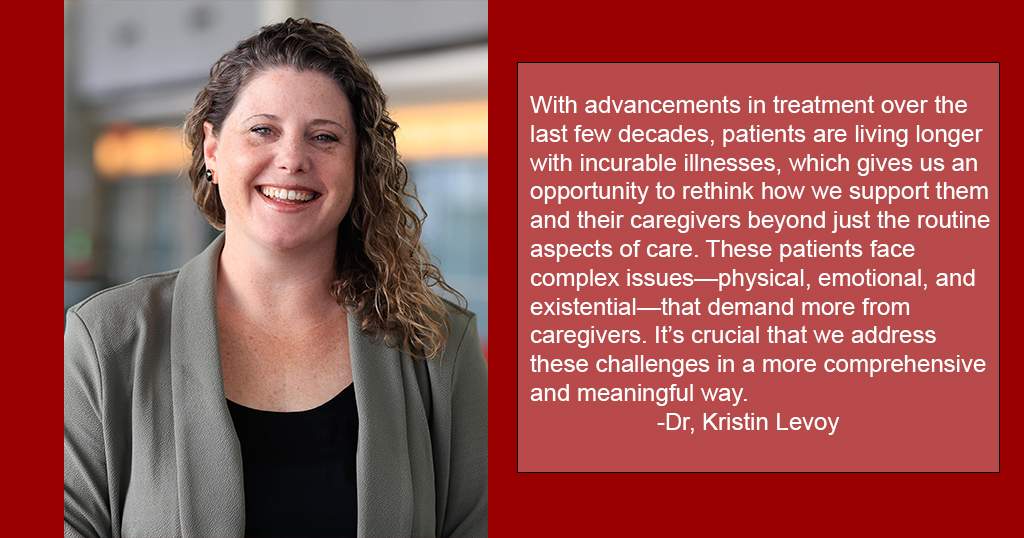Dr. Kristin Levoy, PhD, MSN, RN, OCN, CNE, is an assistant professor at the Indiana University School of Nursing (IUSON) and a research scientist at the IU Center for Aging Research at Regenstrief Institute. Dr. Levoy is also an associate member of the Cancer Prevention and Control Research Program at the IU Melvin and Bren Simon Comprehensive Cancer Center. Her extensive background in oncology nursing drives her research on improving primary palliative care delivery for patients and caregivers through enhanced communication strategies with oncology providers, especially in the context of incurable cancer. Primary palliative care constitutes the delivery of supportive care by providers who are not palliative care specialists, such as oncology providers. Such care allows patients and caregivers to receive supportive care and services earlier in the illness course. To do so requires targeted communication that extends beyond the routine clinical aspects of care (e.g., discussing test results) to also include discussion about informational, physical, emotional, social, and spiritual needs.
Dr. Levoy’s commitment to enhancing supportive care for patients is clear in her latest study, “A Pilot Study of a Sequential, Rapid Triadic Communication Intention Elicitation Intervention (PRECURSOR) to Improve Supportive Oncology Care Delivery among Patients with Incurable Cancer and their Caregivers.” This study addresses the significant challenges in communication that patients, caregivers, and providers face during outpatient oncology visits.
"With advancements in treatment over the last few decades, patients are living longer with incurable illnesses, which gives us an opportunity to rethink how we support them and their caregivers beyond just the routine aspects of care. These patients face complex issues—physical, emotional, and existential—that demand more from caregivers. It’s crucial that we address these challenges in a more comprehensive and meaningful way."
PRECURSOR is designed as a primary palliative care intervention aimed at enhancing communication during outpatient encounters by addressing the supportive care needs of the patient-caregiver-provider triad. The study’s innovative approach uses a technique from cognitive anthropology known as Freelisting, which prompts individuals to list their concerns and communication intentions just before an outpatient encounter. This method helps prioritize the most critical topics, enabling a more focused and meaningful discussion during the clinical visit.
The pilot study aims to evaluate the feasibility and acceptability of PRECURSOR, with a secondary goal of exploring differences in communication behaviors and outcomes between the control and intervention groups. Dr. Levoy’s research emphasizes the importance of integrating supportive care into routine oncology visits, ensuring that both patients and caregivers have their needs assessed and addressed.
PRECURSOR’s triadic approach is particularly unique, as it actively engages patients, caregivers, and providers in communication about supportive care. “Much of the intervention work in improving this communication has been targeted toward healthcare provider communication skills training, which has been insufficient in producing enduring change in communication behaviors and outcomes,” says Dr. Levoy. “The innovation behind PRECURSOR is that there are things we can embed into clinical workflow that help enhance communication about supportive care that is driven by patients’ and caregivers’ in-the-moment priorities, in real-time.”
As Dr. Levoy continues to advance her research, PRECURSOR has the potential to change the way supportive care is integrated into oncology practice. By fostering a more holistic approach to addressing patient and caregiver supportive care needs in this setting of incurable cancer, this intervention could lead to more meaningful clinical encounters, where all voices are heard, and concerns that may have otherwise been missed can be addressed. Dr. Levoy’s work not only aims to improve the quality of life for those facing advanced cancer but also sets a new standard for how we think about and deliver care in the most challenging phases of illness.


